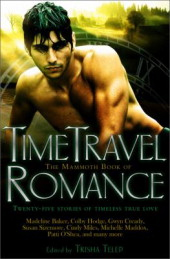
From The Mammoth Book of Time Travel Romance
The merchant hauled himself off the wall and muttered under his breath, “Whatever you say, Saint James…”
Sir James just waved him off and kept walking. The younger man was as straight-backed and strong as he had bene this morning, despite the weight of his chainmail hauberk, his plate shoulder and knee guards, and the sword and dagger slung around his waist. That didn’t include the roll of his cloak and provision bag slung over his back, similar to everhone else. He was the only one armed with anything longer than a dagger, save for the two farmers, who carried the yew bows and capped quivers stuffed with arrows that marked them as Englishmen. Everone else had a walking stick, some worn with years of use and some new, selected just for this trip.
The flapping of Phinneas’ loose sandal kept distracting Anne, as did the older pilgrim’s constant muttering about his discomforts. Anne reminded herself firmly of her mantra as a temporal anthropologist. I am here to make accurate observations about pilgrims in the early fourteenth centruy. Not to perpetuate stereotypes.
Even if I am looking at a fat, greedy, lazy merchant. Thank goodness tonight is my last night amoung these people.
The one she would actually miss was James. The knight wasn’t particularly wealthy; as the third son of some English nobleman up in the Middle Countries, he hadn’t many prospects, particularly in the lull between French and English territory wars when there was no chance of grabbing a plot of land or bringing home loot or a foreign noble for ransoming. She didn’t even know if he had a horse, but then he wouldn’t be using one while escorting pilgrims down to the Iberian peninsula and back; that wouldn’t be suitably pious.